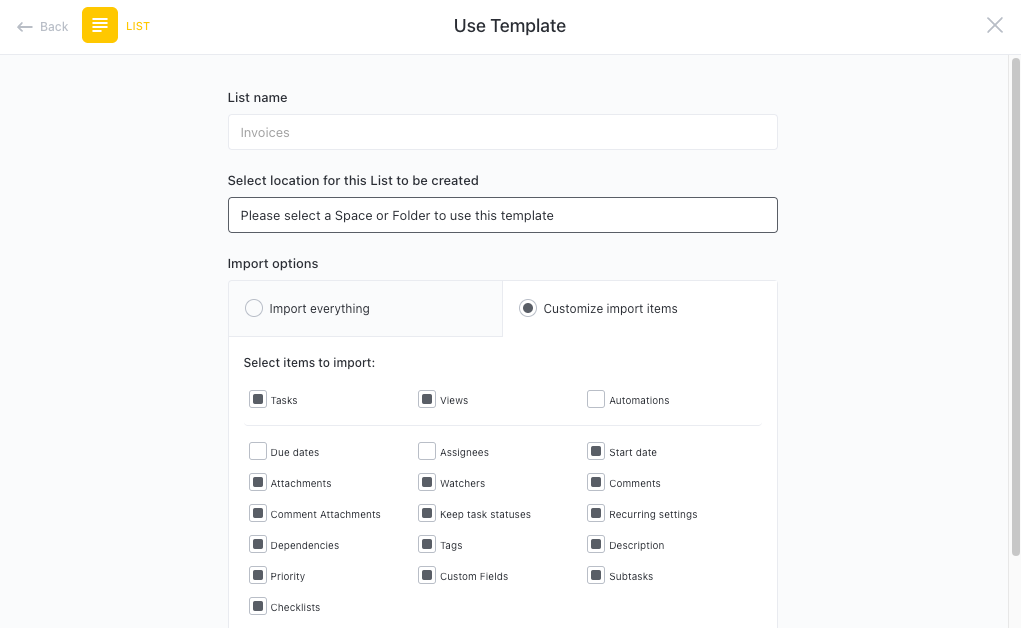Crafting a personal SWOT analysis can be an integral part of achieving success in your career or other endeavors. Taking stock of your Strengths, Weaknesses, Opportunities and Threats will help you identify areas for growth and how to reach your goals.
ClickUp's Personal SWOT Analysis Template is the perfect tool to help you:
- Identify and analyze your individual strengths, weaknesses, opportunities, and threats
- Gain clarity on what’s important in your professional development
- Create actionable plans for achieving specific goals faster
Start making the most of your abilities today—with ClickUp's personal SWOT analysis template!
Benefits of a Personal SWOT Analysis Template
A personal SWOT analysis template helps you to examine yourself objectively and understand your strengths, weaknesses, opportunities, and threats. This type of self-reflection can be beneficial in many ways, such as:
- Helping you identify areas where you need to improve
- Giving you the opportunity to capitalize on your strengths
- Allowing you to develop strategies for overcoming weaknesses
- Helping you better understand yourself and your goals
Main Elements of a Personal SWOT Analysis Template
ClickUp's Personal SWOT Analysis Template is designed to help you identify and manage your strengths, weaknesses, opportunities, and threats. This Task template includes:
- Custom Statuses: Create tasks with various custom statuses to keep track of your personal SWOT progress
- Custom Fields: Categorize and add attributes to manage your personal SWOT analysis, such as Worksheet Link, Completion Rate, Objective, and Timeline
- Custom Views: Start with this Task template and build out your ClickUp workflow which includes List, Gantt, Workload, Calendar, and more
- Project Management: Improve SWOT tracking with comment reactions, nested subtasks, multiple assignees, and priorities
How to Use a Personal SWOT Analysis Template
Using the Personal SWOT Analysis Template in ClickUp can help you to identify your strengths, weaknesses, opportunities and threats to better understand yourself and make informed decisions. Here are the steps to take in order to use it:
1. Gather Your Information
Before you create your SWOT analysis, you need to gather the necessary information. This includes both internal and external factors that could affect you. You should look at your skills, knowledge, experience, and resources. You should also think about external factors such as the current market, potential opportunities, and any threats or risks.
Create a Doc in ClickUp to keep track of all the information you need to include in your analysis.
2. Brainstorm Strengths and Weaknesses
Once you have your information, it’s time to start brainstorming. Look at your skills, knowledge, experience, and resources and think about what strengths and weaknesses these give you.
Use Whiteboards in ClickUp to brainstorm and list out your strengths and weaknesses.
3. Identify Opportunities and Threats
Now you need to look outside of yourself and identify any opportunities or threats that could affect you. This could be anything from a new market trend or potential competitor to a new technology or regulation.
Create tasks in ClickUp to list out potential opportunities and threats.
4. Put it All Together
Now that you’ve identified your strengths, weaknesses, opportunities, and threats, it’s time to put it all together in your SWOT matrix. This will give you a better understanding of your situation and help you make better decisions.
Use the Table view in ClickUp to create a visual representation of your SWOT analysis.
Get Started with ClickUp's Personal SWOT Analysis Template
Individuals can use this Personal SWOT Analysis Template to help everyone stay on the same page when it comes to identifying strengths, weaknesses, opportunities, and threats.
First, hit “Add Template” to sign up for ClickUp and add the template to your Workspace. Make sure you designate which Space or location in your Workspace you’d like this template applied.
Next, invite relevant members or guests to your Workspace to start collaborating.

Now you can take advantage of the full potential of this template to analyze your strengths, weaknesses, opportunities and threats:
- Create a project for your personal SWOT analysis
- Brainstorm and list your strengths, weaknesses, opportunities and threats in the project
- Organize your ideas into categories to keep track of progress
- Set up notifications to stay up-to-date on progress
- Analyze and evaluate your SWOT list to identify areas of improvement
- Create an action plan to address areas of improvement
- Monitor and analyze progress to ensure maximum productivity
Get Started with Our Personal SWOT Analysis Template Today








